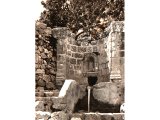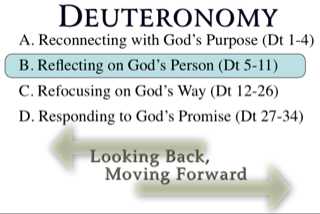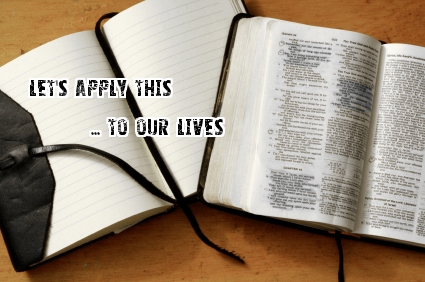Review & Intro: In Chapter 22, we looked at the golden rule of treating others as we would like to be treated. We saw moral laws concerning virgins and the married ones. In Chapter 23, we move into the behavior and rules for the army and their camp as the Lord is among them and holiness is required.
Deuteronomy Chapter 23 - Observation Questions
1. Who was not able to enter the assembly of the Lord? vs. 1
Any one that had being cut emasculated
2. There are several reasons why a man would become a eunuch. Comment on the verses below for some of the answers:
- Matthew 19:12 - Name 3 ways givensome are born that way others are maded that way and other renouned marrage
Note: While some might become enuchs for the sake of the kingdom of God (possibly to give themselves wholly to the Lord and not women, etc.) ... there were cultic practices in the ancient days of Israel's beginnings that did these things for the wrong reasons. Regardless of why they became a eunuch, there was a reason why anything cut off would not be allowed inside the temple. What did the priests and the law of Moses represent? It was all a picture of the Christ to come, the Messiah, who was God's perfect lamb, wholly man and wholly unblemished, a perfect sacrifice to take the sins of the world.
3. What are some encouraging words given to or by eunuchs in the Word? Comment on these verses:
- Isaiah 56:3-5 -
3Let no foreigner who has bound himself to the Lord say,“The Lord will surely exclude me from his people.”And let not any eunuch complain,“I am only a dry tree.”4For this is what the Lord says:“To the eunuchs who keep my Sabbaths,who choose what pleases meand hold fast to my covenant—5to them I will give within my temple and its wallsa memorial and a namebetter than sons and daughters;I will give them an everlasting namethat will not be cut off. - Acts 8:26-39 -
26Now an angel of the Lord said to Philip, “Go south to the road—the desert road—that goes down from Jerusalem to Gaza.” 27So he started out, and on his way he met an Ethiopiand eunuch, an important official in charge of all the treasury of Candace, queen of the Ethiopians. This man had gone to Jerusalem to worship, 28and on his way home was sitting in his chariot reading the book of Isaiah the prophet. 29The Spirit told Philip, “Go to that chariot and stay near it.”30Then Philip ran up to the chariot and heard the man reading Isaiah the prophet. “Do you understand what you are reading?” Philip asked.31“How can I,” he said, “unless someone explains it to me?” So he invited Philip to come up and sit with him.32The eunuch was reading this passage of Scripture:“He was led like a sheep to the slaughter,and as a lamb before the shearer is silent,so he did not open his mouth.33In his humiliation he was deprived of justice.Who can speak of his descendants?For his life was taken from the earth.”e34The eunuch asked Philip, “Tell me, please, who is the prophet talking about, himself or someone else?” 35Then Philip began with that very passage of Scripture and told him the good news about Jesus.36As they traveled along the road, they came to some water and the eunuch said, “Look, here is water. Why shouldn’t I be baptized?”f 38And he gave orders to stop the chariot. Then both Philip and the eunuch went down into the water and Philip baptized him Not far from Betharabah on the old caravan route, down from Jerusalem to Gaza, is the so-called Philip´s Fountain. This has been pointed out since the 15th century as the spring in which Philip baptized the eunuch, chamberlain of Candace, queen of Ethiopia (Acts 8:,26,36). An older tradition places at Hebron the scene of the baptism of Philip´s convert. An early photograph.
Not far from Betharabah on the old caravan route, down from Jerusalem to Gaza, is the so-called Philip´s Fountain. This has been pointed out since the 15th century as the spring in which Philip baptized the eunuch, chamberlain of Candace, queen of Ethiopia (Acts 8:,26,36). An older tradition places at Hebron the scene of the baptism of Philip´s convert. An early photograph.
Note: By these verses, we know that it does not mean that a eunuch would not be accepted into the kingdom of God for salvation through faith in our Lord Jesus Christ. Amen.
4. Who could not enter the assembly of the Lord and his descendants to the 10th generation as well? vs. 2
A forbidden marrages
5. In the Lord Jesus Christ ... our gender, our race, our background, our birth status, etc. matters not. We are all accepted into His kingdom and given all the blessings of faith in Him. Praise His Name! Comment on the following verses:
- John 3:16 -He loves the whole world and died for all of us no matter what race or anythinbg else that may be incorrect in this worlds eyes
- Acts 17:30 -
- Titus 2:11 -
- Romans 10:11-13 -
- Acts 10:28
- Acts 10:34-35
- Galatians 3:28-29 -
6. Back to Deuteronomy 23. Who else were not to enter the assembly of the Lord or their descendants even to the 10th generation? vs. 3
Ammonite Moabite nor their descendants
7. Although, these nations had come from the daughters of Lot through illegimate intercourse with their drunken father, it is not stated for that reason. (see those details in Genesis Chapter 19) ... What are the two reasons given that they were not to enter the assembly of the Lord to the 10th generation? vs. 4
Thfey did not come to meet them with bread or water
8. Although they had hired Balaam to curse Israel, what did the Lord do through Balaam's words and why? vs. 5
bless them
9. What were the Israelites to never seek from the Moabites and the Ammonites? vs. 6
A treaty or friendship with them
10. Do we sometimes seek or long for the peace and prosperity of those who are not believers in the Lord? Read what David said in Psalm 37 and see if you can relate to it at times. Please comment -
Is life unfair? that is what this chapter is asking . the answer to that question is The success of wicked peopl won't last , while in the long run people who do right will flourish. The psalmist adds this obsevation boase on experience: Though a lifetime of troubls and anxieties, he has yet to see the rihgteous abandoned by God and unable to probvide the basics of life for their childern. Their gengrosity doesn't bankrupt them.
11. Back to Deuteronomy 23. Who were the Israelites not to detest and why? vs. 7
Edomite they were brothers
12. How was Edom a brother to Israel? Take time to find out who the father of the Edomites was and another name for Israel. What were the names of these brothers and why were they not friendly with one another? (( a short history lesson ))One of the descendants of Esau or Edom, the brother of Jacob; an Idumean.Genesis 36:43 chief Magdiel, and chief Iram. These are the chiefs of Edom, according to their habitations in the land of their possession. This is Esau, the father of the Edomites
was a Semitic inhabited historical region of the Southern Levant located south of Judea and the Dead Sea. It is mentioned in biblical records as a 1st millennium BC Iron Age kingdom of Edom,[2] and in classical antiquity the cognate name Idumea was used to refer to a smaller area in the same region. The name Edom means "red" in Hebrew, and was given to Esau once he ate the "red pottage", which the Bible used in irony at the fact he was born "red all over".[3]
13. Back to Deuteronomy 23. Who else were they not to destest and why? vs. 7
An Egyptian because they were alin living in their country.
14. When could the sons of the Edomites and the Egyptians enter the assembly of the Lord? vs. 8 ... (( comment if you have insight on this or do research on it)
the third generation.
15. What were they to keep themselves from when they went out as an army? vs. 9
Everything impure
16. What are we called to abstain from as believers? Comment on the following verses:
- 1 Thessalonians 5:21,22 -We are to not do evil.
17. What was a man to do if he awoke and had a nocturnal emission in the night? vs. 10
Go outdide the camp and stay there.
18. What was he to do as evening approached and when was he able to re-enter the camp? vs. 11
wash himself and reenter the camp.
19. They were assigned a place outside the camp to excrete body waste, and they were to cover it up. (vs.12,13). The camp of the Lord was to be kept holy and clean. Who actually walked in their midst to deliver them and to defeat their enemies before them? vs. 14
The Lord God.
20. Where does the Lord walk among His people today? Comment on the following verses:
- Matthew 18:19,20 -19“Again, I tell you that if two of you on earth agree about anything you ask for, it will be done for you by my Father in heaven. 20For where two or three come together in my name, there am I with them.”He is with us all the time .
-
These are the words of him who holds the seven stars in his right hand and walks among the seven golden lampstands: 2I know your deeds, your hard work and your perseverance. I know that you cannot tolerate wicked men, that you have tested those who claim to be apostles but are not, and have found them false.
21. How are we to walk in His presence? Comment on the verses below:
- Colossians 1:10 -10And we pray this in order that you may live a life worthy of the Lord and may please him in every way: bearing fruit in every good work, growing in the knowledge of God,
- 1 Thessalonians 2:12 - 12encouraging, comforting and urging you to live lives worthy of God, who calls you into his kingdom and glory.
22. Back to Deuteronomy 23. ... When a slave escaped from his master, he must of had a reason for it. Rather than return him to his master (as they were to do for an ox or a donkey) ... they were not to return the slave. They were to allow him to live in their midst in any town which he might choose. (vs.15,16)...What did the Lord command them not to do? vs. 16
don't oppress him.
23. Whether a daughter or a son of Israel, they were not to be a cult prostitute, which was something the other nations around them participated in. (vs.17) They were not to bring the wages of a harlot or a dog into the house of the Lord for any votive offering. What were these considered to the Lord? vs. 18 detestable to him.
24. The Israelites could charge interest to a foreigner that borrowed from them, but they were not to charge interest to a fellow countryman on anything they needed. (vs.19,20) ... How are we suppose to respond to those who want to borrow from us? Comment on the following verses:
- Matthew 5:42 -2Give to the one who asks you, and do not turn away from the one who wants to borrow from you.
25. What was the result of not taking interest from a fellow countryman? vs. 20 God would bless them in everything that they put their hands on.
26. When an Israelite made a vow to the Lord, he was to keep that vow or it would be a sin for him. The Lord would surely require it of him. (vs.21-23) ... Would it be a sin if they refrained from making a vow at all? vs. 22 - no
27. What did Jesus teach about making vows? Comment on the verses below:
- Matthew 5:33-37 -33“Again, you have heard that it was said to the people long ago, ‘Do not break your oath, but keep the oaths you have made to the Lord.’ 34But I tell you, Do not swear at all: either by heaven, for it is God’s throne; 35or by the earth, for it is his footstool; or by Jerusalem, for it is the city of the Great King. 36And do not swear by your head, for you cannot make even one hair white or black. 37Simply let your ‘Yes’ be ‘Yes,’ and your ‘No,’ ‘No’; anything beyond this comes from the evil one.
28. When a person had need, they could go into a neighbor's vineyard or field to eat grapes and or gather grain. What were the rules of not taking advantage of their neighbor that were given? vs. 24,25 - not to take mor then they could eat
29. How are we to take care of the needy among us today? Find verses to help support what you answer.
Application:
30. What is required for us to enter the assembly of the Lord?
- Romans 10:9,10 -
31. The Lord is walking among us. How are we to walk before Him?
- Colossians 1:10 -
32. As believers of the Lord, how can we take care of one another today ?
- Matthew 25:34-46 -
- Luke 10:30-37 -
- Acts 4:32-34 -
- Acts 20:35 -
- Galatians 6:10 -
- Ephesians 4:28 -
- 2 Corinthians 9:6,7 -
- 1 Timothy 5:16 -
- James 1:26,27 -
- 1 John 3:17,18 -
33. Summarize this lesson and post a prayer if you would like.


No comments:
Post a Comment